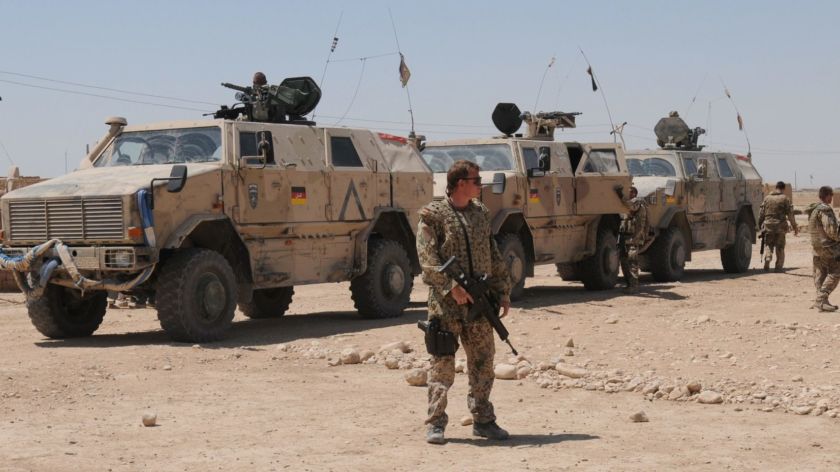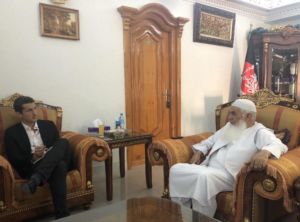‘Warlords are crucial in the US-Taliban deal’
-
 German troops in Afghanistan. Photo: Wikimedia Commons
German troops in Afghanistan. Photo: Wikimedia Commons
Warlords wield enormous influence in Afghan politics. Radboud assistant professor Romain Malejacq wrote a book on how western powers continuously fail to take them into account. ‘Talking to a warlord is the safest thing to do in Afghanistan.’
Conflict studies scholar Romain Malejacq still vividly remembers the first time he entered warlord Ismail Khan’s palace to interview him. ‘Meeting Khan is very impressive, because he exudes authority. He has very tiny eyes which look at you very intensely. And he has a particularly incisive way of answering questions’, he recalls their first meeting. ‘But maybe more important for guests is the fact that you know who he is. A former war hero, inhabitants of Western Afghanistan still visit him to solve their disputes.’
Khan is one of the bigger warlords in Afghanistan. They try to sustain their power in a country that has been at war for 19 years. Most reporting on Afghanistan focusses on the battle between the western-backed Afghan government and the Taliban. But Malejacq demonstrates in his book Warlord Survival: the Delusion of State Building in Afghanistan that warlords are crucial in Afghan politics, serving as intermediary between the central government and local population. They might even prove to be the key in the withdrawal deal between the Taliban and the US, which was brokered recently.
Safe passage

Malejacq, an assistant professor at the Centre for International Conflict Analysis and Management (CICAM) at Radboud University, conducted over two hundred interviews in Afghanistan between 2007 and 2018. He spoke to warlords and their entourage, but also to government officials, journalists and NGO workers. Working in Afghanistan has its risks, Malejacq says, now safely in his Nijmegen office. However, interviewing warlords is actually not that dangerous. ‘If a warlord trusts you, talking to him is actually the safest thing to do, because they control all the weapons in a region.’
Although he conducted interviews across the country for his book, Malejacq focusses on four key warlords in three Afghan provinces. They have several characteristics in common. ‘All successful warlords combine charisma with military legitimacy. Above all, they’re astute political entrepreneurs. They’re very good at reading situations and adapting to them.’
Ismail Khan
Ismail Khan fits all of these boxes. He made a name as ferocious fighter by battling and beating the Soviet-led central government in the 80’s and ‘90. He was then hounded out of his native province Herat and even captured by the Taliban, who around the millennium controlled most of Afghanistan. His influence in Afghanistan appeared to be all but lost. The 9/11-attacks proved to be a pivotal moment for Khan – and the whole of Afghanistan. Enraged after the first attacks against the United States since Pearl Harbour, then-president George W. Bush decided to attack the Taliban for aiding Al Qaida.
The western states are deluded if they want to build a western-style state in Afghanistan
‘The US had no plan for Afghanistan’, Malejacq says. ‘At the time, very few Americans would have been able to locate Afghanistan on the map, even within the administration. The US government simply wanted to get in, beat the Taliban and get out. The initial idea was to have a footprint as light as possible, so they sponsored the warlords to fight on the ground. Meanwhile, the US air force bombed Taliban positions.’
Jihad-museum
For warlords such as Khan, the American money proved to be a godsend. Malejacq: ‘This allowed them to re-establish themselves. Once they had control over a territory, they tried to transform that power into gaining political power.’ Startled by the increase in power of the warlords, who often had jihadi tendencies themselves, the US-backed Afghan government tried to get rid of them. Under intense pressure, they were forced to adapt: they gave up their personal armies, but used politics to enrich themselves further. Khan, like many other warlords, served as a minister in Kabul.

Once the warlords didn’t have personal militias to their disposal, they needed to take other measures to ensure their constituents remained loyal. They attempted to strengthen their bond with local constituents by doling out favours. They also tried to create a mythical image of themselves, often based on their fights in the independence war.
Khan, for instance, built a Jihad museum to celebrate his military achievements in his hometown Herat. And he values that a lot. When Malejacq failed to name the museum as his favourite place in the city during the interview, Khan angrily rebuked. ‘He shut down and stopped talking completely’, Malejacq recalls. ‘Only after a few minutes he started talking again, asking why I didn’t name the museum as my favourite place.’
Comeback kids
The warlords are currently staging a comeback as foreign troops increasingly pull back from the country. Malejacq says that The Netherlands, the US and other countries involved completely failed to establish a long term-vision for Afghanistan. ‘Countries like The Netherlands have taken centuries to modernise. It is a delusion to think that the international community can quickly build a western-like system in a fragmented state like Afghanistan.’
The incorporation of warlords will become especially important if the withdrawal agreement between the Taliban and the US, which was unveiled several weeks ago, will actually be implemented. The deal discusses a retreat of US forces if the Taliban refrain from attacking the central government. Malejacq warns that to be successful, an agreement has to include the warlords. ‘They are extremely resilient and have the power to destabilise the country. If the warlords are not included in the talks or not happy with the outcome, they might return to fight the government.’
‘It is a tricky balance: give the warlords enough so they won’t rebel against the state, but make sure not to empower them. We still don’t know how to work on this very thin line.’



